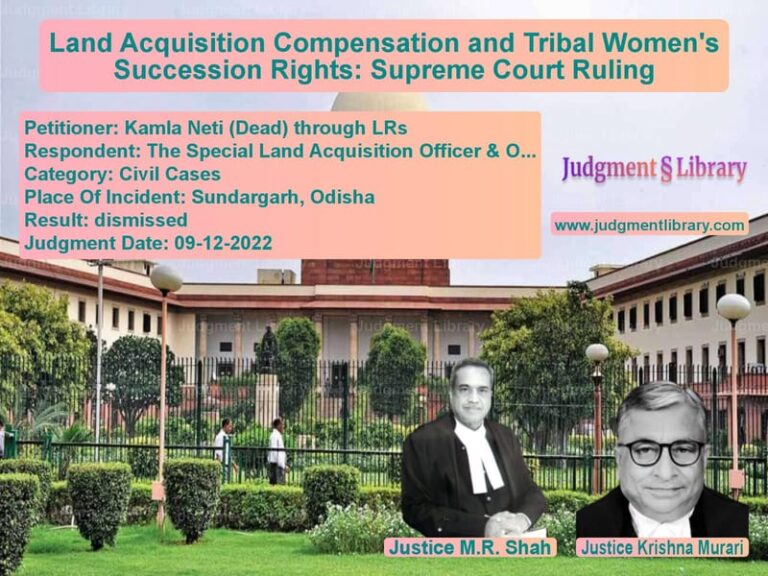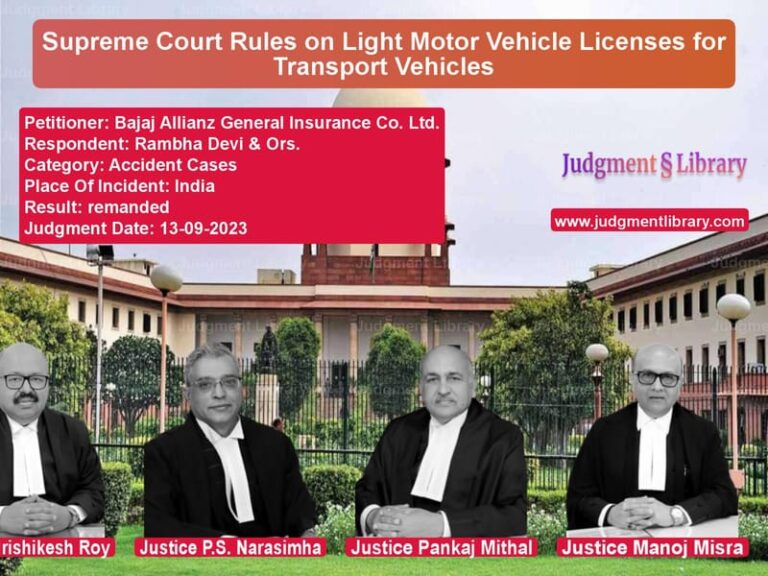Supreme Court Allows Nashik Municipal Corporation’s Appeal in Execution Petition Dispute
The Supreme Court of India, in the case of Nashik Municipal Corporation vs. M/S R.M. Bhandari & Another, addressed a prolonged legal battle concerning the execution of a decree related to construction contracts. The dispute revolved around the restoration of an execution petition that had been dismissed due to procedural delays in depositing costs.
The Court allowed the appeal, set aside the High Court’s order, and granted the Nashik Municipal Corporation an extension to deposit the required cost, enabling the execution petition to proceed.
Background of the Case
The case originated from a contract awarded by the Nashik Municipal Corporation (appellant) to M/S R.M. Bhandari (respondents) for construction work. Due to alleged delays in project completion, the contract was reallocated, and the municipal corporation claimed financial damages.
The corporation filed a Special Civil Suit No. 339 of 1991 seeking recovery of an excess expenditure of Rs. 29,76,740 incurred due to the project reallocation. The respondents also filed a counter-suit (Special Civil Suit No. 171 of 1991) against the corporation. The trial court ruled in favor of the municipal corporation, ordering the respondents to pay Rs. 29,40,366 along with 18% interest per annum.
Petitioner’s (Nashik Municipal Corporation) Arguments
- The appellant argued that its execution petition was wrongly dismissed due to a technical delay in depositing the cost imposed by the High Court.
- It contended that the High Court failed to consider the reasons for the delay in making the deposit.
- The corporation maintained that its legal right to restore the execution petition should not be denied due to procedural delays beyond its control.
Respondent’s (M/S R.M. Bhandari) Arguments
- The respondents contended that the municipal corporation had failed to comply with the High Court’s deadline for depositing costs.
- They argued that since the execution petition was dismissed, the first appeal filed by them had been withdrawn in good faith.
- The respondents claimed that restoring the execution petition at this stage would be prejudicial to them.
Supreme Court’s Ruling
The Supreme Court, in a judgment delivered by Chief Justice T.S. Thakur and Justice R. Banumathi, allowed the appeal and restored the execution petition, emphasizing that procedural delays should not prevent the enforcement of legitimate claims.
1. Extension of Time for Deposit Allowed
The Court ruled that the municipal corporation had provided a reasonable explanation for the delay in depositing costs and that the High Court should have granted an extension.
“The High Court while declining to enlarge the time to deposit the cost neither took into consideration the sequence of dates and events stated by the appellant-corporation nor the explanation offered by the appellant-corporation for the delay in depositing the amount.”
2. Execution Petition Restored
The Supreme Court set aside the High Court’s order and restored Special Darkhast No. 49 of 2002, enabling the municipal corporation to proceed with the execution of the decree.
3. Respondents Granted Right to Restore Appeal
Recognizing the respondents’ concern that they withdrew their appeal due to the execution petition’s dismissal, the Court allowed them to restore their first appeal if they wished.
“While extension of time is granted to the appellant to deposit the cost, the respondents cannot be rendered remediless and in our view, the respondents are to be given liberty to have their first appeal restored by making necessary application before the first appellate court.”
Final Verdict
The Supreme Court issued the following directives:
- The appeal was allowed, and the High Court’s order was set aside.
- The municipal corporation was granted four weeks to deposit the cost of Rs. 25,000.
- Upon deposit, Special Darkhast No. 49 of 2002 would stand restored.
- The respondents were granted liberty to restore First Appeal No. 344 of 1995 if they chose.
- No costs were imposed on either party.
Conclusion
This judgment reinforces the principle that procedural delays should not prevent the execution of legitimate decrees. The ruling ensures that justice is served while balancing the rights of both parties.
Key Takeaways:
- Courts have discretion to extend deadlines when procedural delays occur.
- Execution petitions should not be dismissed on technical grounds when legitimate claims exist.
- Respondents withdrawing appeals based on procedural dismissals should have the option to restore them.
- Municipal bodies must ensure compliance with procedural requirements to avoid unnecessary litigation.
This ruling serves as an important precedent for execution petitions and procedural compliance in civil litigation.
Don’t miss out on the full details! Download the complete judgment in PDF format below and gain valuable insights instantly!
Download Judgment: Nashik Municipal Cor vs MS R.M. Bhandari & Supreme Court of India Judgment Dated 26-02-2016-1741852839500.pdf
Direct Downlaod Judgment: Direct downlaod this Judgment
See all petitions in Contract Disputes
See all petitions in Damages and Compensation
See all petitions in Specific Performance
See all petitions in Judgment by T.S. Thakur
See all petitions in Judgment by R. Banumathi
See all petitions in allowed
See all petitions in supreme court of India judgments February 2016
See all petitions in 2016 judgments
See all posts in Civil Cases Category
See all allowed petitions in Civil Cases Category
See all Dismissed petitions in Civil Cases Category
See all partially allowed petitions in Civil Cases Category







